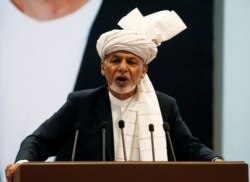The Afghan Taliban are blaming the United States for this week's failed prisoner swap between the two adversaries, saying the American side did not show up at a mutually agreed upon venue, somewhere inside Afghanistan.
Zabihullah Mujahid, the chief spokesman for the insurgent group, told VOA on Friday that the deal was suspended for now, and that it was up to U.S. officials to explain why they reneged on their promise.
The prisoner exchange could have secured freedom for two Western hostages, American Kevin King and Australian Timothy John Weeks, who have been in Taliban captivity since August 2016.
Three insurgents
In return, three high-profile insurgent detainees, including death row prisoner Anas Haqqani, the younger brother of the Taliban's deputy chief of military operations, Sirajuddin Haqqani, would have been released from the Bagram jail north of the Afghan capital.
"As per the deal with the Americans, our prisoners were to be taken to the mutually agreed safe location and freed there. We would have then released and handed the American (and his colleague) over to them," Mujahid said in a Pashto language audio message he sent to VOA.
The Taliban had implemented their part of the deal and the Americans were mainly responsible for failing the process by not showing up at the location in question, Mujahid asserted.
There was no immediate reaction from the U.S. to the Taliban assertions.
Ghani speech
Afghan President Ashraf Ghani in a televised address to the nation on Tuesday announced that he had decided to "conditionally" release insurgent detainees to secure freedom for the two ailing foreign academics, hoping it would pave ground for direct peace talks between his government and the Taliban.
King, 62, and Weeks, 50, were teaching at Kabul's American University of Afghanistan before they were kidnapped at gunpoint near the campus three years ago.
Ghani's announcement led to widespread speculation that the prisoner swap had already occurred and that the three insurgent prisoners had been flown to Qatar to join the Taliban's political office there.
But Mujahid denied those reports while speaking to VOA on Friday and insisted Taliban prisoners had never been freed in the first place from the Bagram detention center, which is jointly run by Afghan and U.S. authorities.
The foreign professors are still in Taliban custody, Mujahid added.
A push for talks?
It is widely perceived that the prisoner swap, if it goes through, could help restart stalled U.S.-Taliban peace negotiations aimed at ending the Afghan war, the United States' longest overseas military intervention.
President Donald Trump abruptly canceled the peace talks in September, citing continued deadly Taliban attacks in Kabul, one of which killed a U.S. soldier.
The prisoner exchange is also being seen as key to the success of an intra-Afghan peace conference China is expected to host this month.
During the two-day event, Taliban officials and a delegation from Kabul are expected to exchange views on how to end decades of hostilities in Afghanistan.





